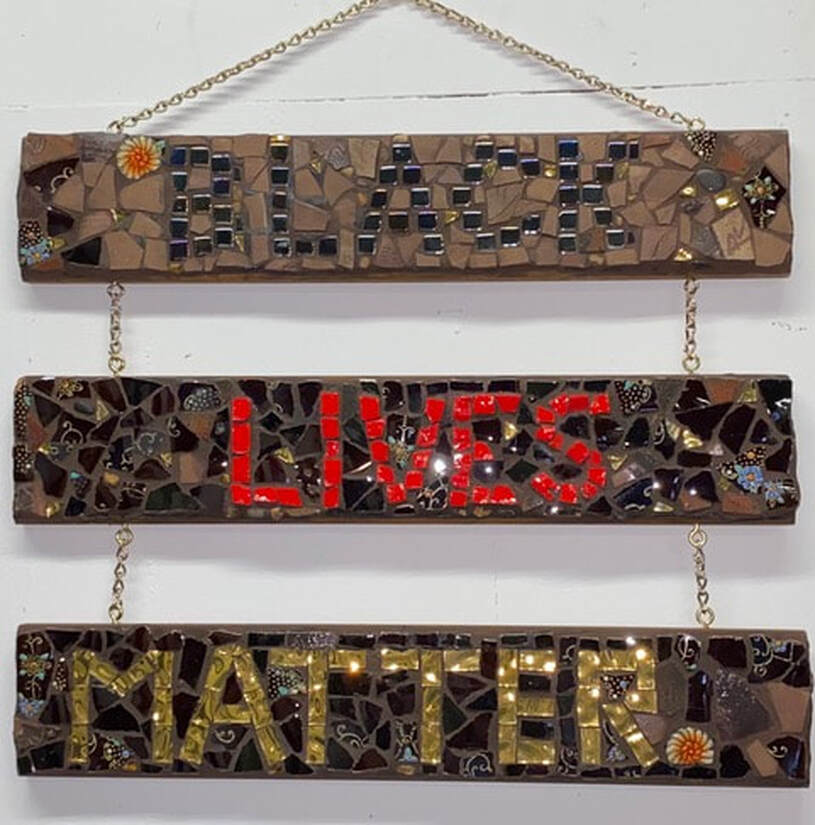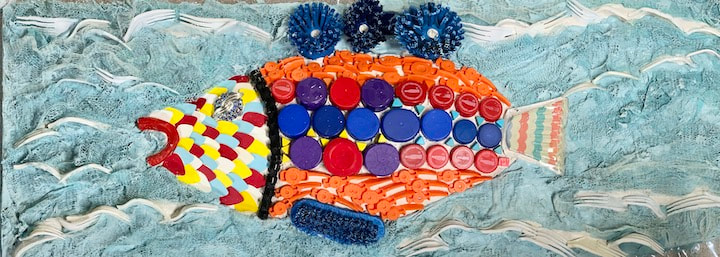|
I've been reading, watching, and listening for many months to the ongoing discussions sparked by the violent and completely unnecessary deaths of so many black and brown people. I've signed petitions and donated funds to some of the organizations doing work on this issue, but I've refrained from attending protests and felt bad about that. So this was what I did instead. My goal in creating this piece was to stress each word equally, with space between them, so that viewers would really pay attention to each word: BLACK. LIVES. MATTER. Thus, each word got its own panel.
I added two small sunflowers (thanks to a vintage teapot donated to me by my artist friend Sharon Fischer) at the beginning and the end, to acknowledge George Floyd and his still-growing life after death. The teapot also shows up in some of the dark brown patterned pieces. The entire background consists of broken pottery. Our lives all contain broken pieces, and we all need to be regularly put back together. But black and brown lives have been especially, consistently, and purposefully broken throughout this country's history. I want this piece to live somewhere public--not in my studio where only I will see it. If you have suggestions of an organization doing positive work that might like it, please let me know. Scientific Name: Epinephelus plasticus
Common name: Bottlecap Grouper The only species of grouper (slow-swimming, medium-to-large fish with stout bodies and large mouths) whose population is documented to be expanding rather than decreasing, Epinephelus plasticus is considered invasive in many of the world’s oceans. A moderately large fish, usually achieving 2-4 feet in length, the Bottlecap Grouper is also is relatively extremely lightweight and bouyant; it can often be spotted floating on the surface of the water. Colorful, variegated markings, usually striped, characterize the fish. Whereas the majority of grouper species are declining in numbers, and some (e.g., Epinephelus striatus or Nassau grouper)* is threatened throughout its range, the Bottlecap Grouper subsists entirely on plastic waste, and thus has a virtually infinite supply of food. Because its population is extremely large, expanding and taking over habitat needed to support other species, and it has no known predators, it is considered an invasive species. It also exhibits an entirely unique method of reproduction*, spontaneously assembling into new individuals in waters containing large amounts of plastic detritus (e.g., the Great Pacific Garbage Patch. Epinephelus plasticus is abundant worldwide. *Prior to this discovery, the concept of "spontaneous generation" had been thoroughly debunked by science and thought to be impossible. |
AuthorSusan Altman: Mosaicist, Community Artist, Writer/Editor Archives
February 2022
Categories |
Email: [email protected]


 RSS Feed
RSS Feed